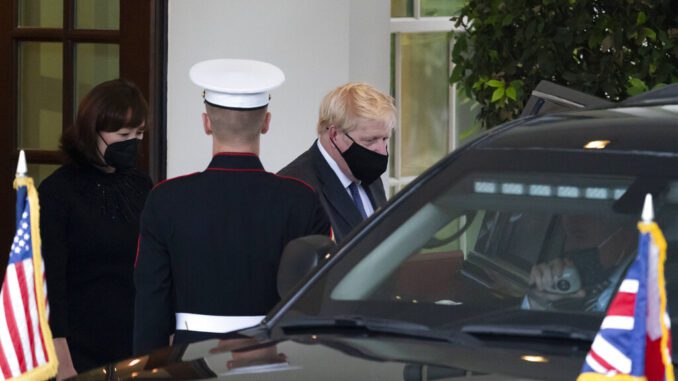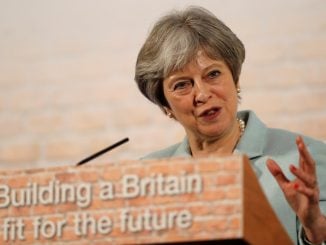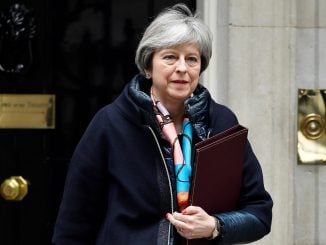
LONDON — British Prime Minister Boris Johnson conceded Wednesday that a post-Brexit trade deal with the U.S. was not imminent as he voiced confidence that the decades-long U.S. ban on imports of British lamb would be lifted.
A day after President Joe Biden downplayed the prospect of a trade deal by not pushing back on a suggestion that Britain was at the back of the line, Johnson said British farmers, notably those in Wales, would soon be able to export lamb to the U.S. once again.
“I can tell you today that what we’re going to get from the United States now is a lifting of the decades old ban, totally unjustified, discriminating on British farmers and British lamb,” he told reporters outside the U.S. Capitol in Washington. “It’s about time too. And what we’re wanting to do is make solid incremental steps in trade.”
Despite Johnson’s claims the U.S. would be lifting the ban on British lamb, his office at Downing Street later said the details still needed to be worked out.
The U.S. has banned the import of British beef and lamb since 1989, as a result of BSE ((bovine spongiform encephalopathy), which is widely known as “mad cow disease.” The ban on beef has already been lifted.
Phil Stocker, chief executive of the National Sheep Association, said farmers were delighted by the announcement. He said the domestic lamb market accounts for between 60-65% of production, with the European Union the biggest export market.
“However, access is more difficult than it was when we were part of the EU,” Stocker said. “It’s essential to maintain EU access but it is also important to work on any market that gives us future potential.”
These modest piecemeal trading arrangements are a far cry to what Johnson and other Brexit backers were pushing for when campaigning for Britain’s departure from the EU back in 2016. They argued that one of the great prizes of leaving the bloc would be an overarching trade deal with the U.S. that would see tariffs and quotas eliminated on a wide array of goods. Although the U.S. alone is the U.K.’s biggest trading partner, the EU countries as a whole account for around half of the U.K.’s trade in goods and services.
“The Biden administration is not doing free trade deals around the world right now but I’ve got absolutely every confidence that a great deal is there to be done,” Johnson said.
Unlike his predecessor Donald Trump, Biden has shown little interest in negotiating a trade deal with Britain, partly because of his concerns about Northern Ireland.
Ahead of his talks Tuesday with Johnson at the White House, Biden voiced worries about Northern Ireland following recent talk that the British government wants to renegotiate the post-Brexit deal with the EU that it signed at the end of last year.
Biden said he felt “very strongly” about issues surrounding Northern Ireland’s peace process. Under the Northern Ireland Protocol for Brexit, customs and border checks have been imposed on some goods moving between Northern Ireland and the rest of the U.K. in order to prevent a physical border once again being put up between Ireland, which is part of the 27-nation EU, and Northern Ireland. That’s angered Northern Ireland’s unionist community, who say the checks amount to a border in the Irish Sea and weaken Northern Ireland’s ties with the rest of the U.K.
One of the significant achievements of Northern Ireland’s peace process was its nearly invisible border with Ireland.
“I would not at all like to see, nor, I might add, would many of my Republican colleagues like to see, a change in the Irish accords, the end result having a closed border in Ireland,” said Biden, who has consistently shown pride in his Irish roots.
Since Britain formally left the economic structures of the EU at the start of this year, the country has sought to re-orientate its trade profile away from Europe. It is pushing to join the 11-country Comprehensive and Progressive Agreement for Trans-Pacific Partnership, which is home to around half a billion people in and around the Pacific.
There’s even talk that Britain may look to join the trade partnership between the U.S., Canada and Mexico.



